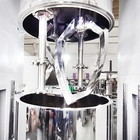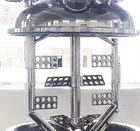Integrating development, manufacturing and sales, as a first-level mixer emulsifier factory.
Never Overlook Compliance & Safety
When a company invests in a new machine — whether it's a filling machine, double planetary mixer, or even a lab-scale system — the first thought is usually the cost and return on investment. The question becomes: “Will this machine make us money?”
While that's a valid and important consideration, it's just as critical to look beyond ROI and focus on what comes with it: Compliance and Safety.
It’s easy to assume that safety and compliance features are already included in any machine, and that you don’t need to worry about it. But overlooking these factors can be dangerous — not only for your team, but also for your entire company.
Neglecting Industry Standards and Certifications
"GMP, FDA, CE, ISO – these depend on your industry and market."
No matter what kind of machine you're buying, you must ensure it meets the relevant regulations and standards for your industry and country. These certifications confirm that:
- The machine is safe to operate
- It’s made from approved materials
- It meets quality, hygiene, and performance requirements
Before purchasing any equipment, know which certifications apply to your industry, and verify that the supplier holds them.
Common Certifications :
|
Standard |
What It’s For |
|
GMP (Good Manufacturing Practices) |
Required in pharma, food, and cosmetics. Ensures hygiene, consistency, and cleanliness |
|
FDA Approved (U.S.) |
Ensures materials in contact with food or drugs are safe and non-contaminating. |
|
CE Mark (Europe) |
Confirms the machine complies with EU safety standards — mandatory in European markets |
|
ISO Certifications |
Global standards for quality, safety, and management (e.g., ISO 9001 for manufacturers). |
Why It Matters:
If your equipment doesn't have the proper certifications, your operation could face:
- Facility shutdowns by regulators
- Inability to sell in certain markets
- Product recalls or contamination risks
This is not just about "checking the box." Certifications are a guarantee to you and your customers that the machine is safe, compliant, and ready for use.
Overlooking Safety Features
"Emergency stops, guards, and sensors are non-negotiable in many environments."
Depending on its function, a machine can be powerful and potentially dangerous — capable of crushing, cutting, or spraying if something goes wrong. That’s why safety features are essential.
Key Safety Features:
- Emergency Stop Button – Immediately shuts down the machine in case of an emergency
- Protective Guards – Transparent covers or barriers to prevent contact with moving parts
- Safety Sensors – Detect if a hand or object is in the wrong place and stop the machine automatically
- Lockout/Tagout System – Ensures the machine stays off during maintenance or cleaning
Without these features:
- Workers are at risk of serious injury
- Your company could face lawsuits or insurance claims
- Authorities may halt your production due to violations
Worker safety should never be assumed. Collaborate with your supplier and the employees who will use the machine daily. Together, review and adapt safety systems to fit real-world usage and prevent injuries or costly accidents.
Safety Over Cost
Meeting compliance and safety standards can make machines more expensive. Certified equipment or customized safety features may increase the upfront price. But in the long run, this investment protects your:
- Consumers
- Employees
- Business operations
It also helps you avoid costly mistakes, legal issues, and production downtime — keeping your facility open and productive.
Once safety and compliance are covered, it's time to think about efficiency — especially when it comes to cleaning.
Reduce Energy Waste with Clean-in-Place (CIP) Systems
"CIP = Clean-in-Place: A system that lets a machine clean itself without disassembly."
In industries like food, pharmaceuticals, and cosmetics, frequent deep cleaning is essential to prevent:
- Bacterial contamination
- Cross-contamination (e.g., allergens or chemicals)
- Product buildup and malfunction
A CIP system automatically cleans internal parts by pumping cleaning fluids through the machine — saving time and improving consistency.
Why It Matters:
- Manual cleaning takes time and stops production
- Mistakes during cleaning can ruin entire batches
- Lack of CIP may result in hygiene violations and shutdowns
Time Is Money
Beyond reducing risks, automated cleaning also improves efficiency. It minimizes downtime and maximizes machine usage — which translates to higher productivity and better ROI.
Focus & Ensure: A Quick Recap
|
Mistake |
What Happens |
Why It’s Bad |
|
Skipping safety features |
Workers at risk |
Accidents, legal issues, inspections |
|
Ignoring certifications |
Machine fails to meet standards |
Fines, shutdowns, blocked sales |
|
No CIP system |
Cleaning is slow and inconsistent |
Contamination, non-compliance, lost production time |
Final Thought:
When it comes to industrial machinery, never overlook safety and compliance. They aren’t optional — they’re the foundation for sustainable, productive, and responsible operations.














































































































